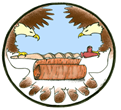General Election: June 28, 2021 Candidates for Tribal Council
RICKY COMPO
TAMARA KIOGIMA
LEROY SHOMIN
DOUG EMERY
WILLIAM ORTIZ
MARCI REYES
KENNETH DEWEY
AARON OTTO
SHARON SIERZPUTOWSKI
SIERRA BODA (WITHDREW 5-14-21)


The Judiciary has directed that new and amended Court rules shall be proposed to the Judiciary, as a whole, who then shall vote on whether to put forward the purposed rule for comment either at a Judiciary meeting or by email. A record of said vote shall be kept by the Court Administrator. Resolutions or amendments that the Judiciary votes to put forward for public comment by at least a majority vote of the Judiciary shall be placed on the LTBB website within seven (7) days of adoption. The public shall be invited to comment on proposed rules for thirty (30) days. The Court Administrator shall send to the Judiciary by email all comments received within seven (7) days of the closing of the comment period. The Judiciary shall either vote to accept with comments, accept without comments, or reject the proposed rule and/or amendment.
If the Judiciary votes to make a proposed rule final, the final rule shall take effect immediately upon publication on the LTBB website. All final amendments or rules shall be published in the Odawa Trails as soon as possible but no later than ninety (90) days from adoption.

Please see the following amendment to Little Traverse Bay Bands of Odawa Indian Court Rule 8.504 that has been approved by the Judiciary on September 4, 2020.
By electronic votes of the Tribal Judiciary on June 22 and June 25, 2020 the LTBB Rules of Civil Procedure has been amended as follows:
At arraignment, the Court shall address the issue of bail/bond and decide whether the defendant should be released on their own recognizance, or be required to post a cash or surety bond with the Court, and if so, designate the amount. The Court shall also determine whether any conditions of release are appropriate to the case, and order same. Conditions may include, but are not limited to, the following:
By an electronic vote of the Tribal Judiciary on March 13, 2020 Rule VI of the LTBB Rules of Civil Procedure has been amended as follows:
Rule VI SERVICE OF PLEADINGS AND OTHER PAPERS Section 1. Manner of Service. Service of all papers contemplated under these Rules may be made in any manner allowed by these rules. Continue Reading…
The mission of the Tribal Court is to implement the Little Traverse Bay Bands of Odawa Indians judicial system, consistent with self-determination and the sovereign powers of the Tribe, by building on the community values of respect, culture and spirituality, that allows for unity, fairness and due process in resolving issues, conflicts and disputes within the Little Traverse Bay Bands of Odawa Indians’ jurisdiction.
The Tribal Judiciary is a separate branch of tribal government established by the tribal constitution. It decides questions concerning the scope and existence of tribal power and gives definition to the substantive law governing the tribe. It is responsible to protect the procedural and individual rights of the Little Traverse Bay Bands of Odawa Indian people and entities subject to tribal jurisdiction.
The judicial power of the Little Traverse Bay Bands of Odawa Indians is vested in a tribal court system composed of a court of general jurisdiction, called Tribal Court, and an appellate court, called Tribal Appellate Court.
The chief judge and associate judge preside over all civil and criminal cases in Tribal Court arising under the tribal constitution, statutes, regulations, or judicial decisions of the Little Traverse Bay Bands of Odawa Indians. Tribal Court’s jurisdiction is based upon the Tribe’s inherent sovereignty, traditional custom, and federal law.
The Tribal Appellate Court consists of a chief justice and two associate justices that hear appeals from Tribal Court. All Tribal Appellate Court decisions are final and cannot be appealed.
Through this structure, the Court’s vision is to secure the full enjoyment of community and personal rights guaranteed by tribal law, federal law, and the tribal constitution through a fair, just and impartial judiciary system.
RICKY COMPO
TAMARA KIOGIMA
LEROY SHOMIN
DOUG EMERY
WILLIAM ORTIZ
MARCI REYES
KENNETH DEWEY
AARON OTTO
SHARON SIERZPUTOWSKI
SIERRA BODA (WITHDREW 5-14-21)
BERNADECE (BERNIE) BODA & LINDA GOKEE
REGINA GASCO-BENTLEY & STELLA KAY
(Click Team To Read Their Statements)
BERNADECE (BERNIE) BODA & LINDA GOKEE
REGINA GASCO-BENTLEY & STELLA KAY
(Click Candidate Name To View Their Statement)
Search Code Index
function search(string){ window.find(string); }
LTBB Events
Sun Mon Tue Wed Thu Fri Sat
Contact SPRING
[ninja_form id=12]
https://app.hellosign.com/s/LJki90VA